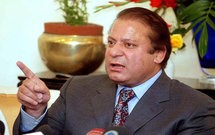 The meeting comes two days after Afghan President Hamid Karzai congratulated Nawaz Sharif on winning elections in Pakistan. The president also expressed hope that the new government would help negotiate an end to the Taliban insurgency as NATO troops withdraw from Afghanistan next year. Indian Prime Minister Manmohan Singh congratulated Sharif on his victory shortly after it became clear that the former two-term Pakistani prime minister's party was headed for certain victory.
The meeting comes two days after Afghan President Hamid Karzai congratulated Nawaz Sharif on winning elections in Pakistan. The president also expressed hope that the new government would help negotiate an end to the Taliban insurgency as NATO troops withdraw from Afghanistan next year. Indian Prime Minister Manmohan Singh congratulated Sharif on his victory shortly after it became clear that the former two-term Pakistani prime minister's party was headed for certain victory.
In India, the media reported that Singh would not attend Sharif's inauguration ceremony after Sharif extended Singh an invitation. But from the Indian point of view, Sharif being elected for a third time is a positive development. After all, it was during Sharif's last stint in office that the two South Asian rivals were in the process of putting their historical enmity behind them with former Indian Prime Minister Atal B. Vajpayee's famous 1999 road trip to the eastern Pakistani city of Lahore.
Those efforts were derailed by the Kargil War in the summer of 1999. The conflict began when then-Pakistani army chief Gen. Pervez Musharraf began a covert operation across the line of control in the disputed Kashmir region without permission from the Sharif government. The United States mediated an end to that conflict, but within months, Musharraf ousted Sharif after Sharif tried to fire him. The extent to which Sharif is able to get the country's military establishment on board with his peace agenda as well as his ability to curb anti-Indian Islamist militant outfits from operating in Pakistan will determine how far Sharif will be able to normalize ties with India.
Meanwhile, a much more complex geopolitical game is forming on Pakistan's western front. Kabul is hoping that Sharif's party winning Saturday's elections will help Afghanistan secure Pakistani cooperation in negotiation efforts for a political settlement with the Taliban ahead of the 2014 NATO military drawdown. Understanding that Sharif has very close relations with the Saudis, Kabul is hoping that Riyadh will be able to help. The Saudi kingdom is indeed pleased about Sharif's electoral victory, since the outgoing government of Pakistani President Asif Ali Zardari was closer to Iran, Saudi Arabia's principal rival.
Therefore, the Saudis would be eager to help the Afghan government get the Pakistanis' cooperation on the issue of the Taliban. Riyadh, however, would exact a price, which is that the Karzai administration put some distance between itself and Iran. Tehran (ironically along with the United States) has been financially assisting the Afghan state.
Saudi Arabia can more than match the Iranian financial assistance to Afghanistan. Furthermore, with Sharif's election, Riyadh now wields influence with both the Pakistani political and security sectors, as is evident from the mediation between the Musharraf regime and the Sharif clan during the 2000-2007 period, when the Saudis hosted the Sharif clan, which had been exiled by Musharraf. From the Afghan point of view, the situation seems ideal. The only problem is that Afghanistan shares a border with Iran (not Saudi Arabia), which means that it cannot abandon Tehran and align with Riyadh.
The Saudis can help with the Pakistanis and by extension the Taliban. But the Iranians can derail any such initiatives because they wield influence among many warlords in Afghanistan who are at odds with both Karzai and the Taliban. Therefore, the Afghanistan-Pakistan region is about to become an arena for Saudi-Iranian rivalry once again. Sharif's election is potentially positive for the Indians, Afghans and, of course, the Saudis, but the extent to which either side can derive benefit remains to be seen.
Courtesy : Stratfor (www.stratfor.com)